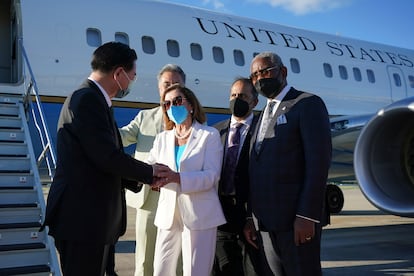US and Taiwan to start formal trade talks amid tensions with China
According to the negotiating mandate, the discussions will look at ways to address ‘distortions’ in international trade due to state-owned enterprises


As US-China tensions continue to simmer over Speaker of the House Nancy Pelosi’s visit to Taiwan, the United States announced on Wednesday that it will begin trade talks with Taiwan under a new initiative. “The negotiating mandate announced today sets out the broad objectives shared by the two sides for the upcoming trade negotiations. It is expected that the first round of negotiations will take place early this fall,” the Office of the US Trade Representative said in a statement.
Washington and Taipei unveiled the U.S.-Taiwan Initiative on 21st-Century Trade in June, just days after the Biden administration excluded the Chinese-claimed island from its Asia-focused economic plan designed to counter China’s growing influence. The resumption of talks comes at a moment of heightened tensions with China. Beijing responded to Pelosi’s trip to Taiwan by carrying out threatening military drills around Taiwan. A subsequent visit by a delegation of US lawmakers to the island also triggered fresh military exercises.
According to the document outlining the negotiating mandate, the new talks between the US and Taiwan will address a broad agenda of topics including trade facilitation, good regulatory practices, anticorruption standards, improving trade between small and medium-sized enterprises and ways to “address the significant distortions that can occur to international trade and investment from the nonmarket practices of state-owned and state-controlled enterprises” – a point that appears targeted at China.
The document states that these distortions may be addressed “through the adoption of provisions designed to create a level playing field for workers and businesses when competing against these entities in the international marketplace, including by ensuring that these entities act in a commercial manner, are regulated impartially and do not provide or receive trade distorting non-commercial assistance.”
“[The negotiations] will deepen our trade and investment relationship, advance mutual trade priorities based on shared values, and promote innovation and inclusive economic growth for our workers and businesses,” said Deputy United States Trade Representative Sarah Bianchi in a statement. “We plan to pursue an ambitious schedule for achieving high-standard commitments and meaningful outcomes covering the eleven trade areas in the negotiating mandate that will help build a fairer, more prosperous and resilient 21st century economy.”
Meanwhile, relations between the US and China remain frayed. At a press conference on Tuesday, the Chinese ambassador to the United States, Qin Gang, criticized Pelosi’s visit to Taiwan and called on the US to reconsider its position on the island. “I want to see the United States at the moment to think about its own behavior on Taiwan, to reflect on what the true one-China principle is, and to refrain from doing anything more to escalate the tension, because there are some worries around these days in China that the US will take more actions, politically, militarily. If they happen, it will cause a new round of tensions and China will be forced to react,” he said.
Washington, however, continues to maintain that China overreacted to Pelosi’s visit to Taiwan. “China has overreacted, and its actions continue to be provocative, destabilizing, and unprecedented,” said Kurt Campbell, the White House coordinator for the Indo-Pacific, on Tuesday.
Tu suscripción se está usando en otro dispositivo
¿Quieres añadir otro usuario a tu suscripción?
Si continúas leyendo en este dispositivo, no se podrá leer en el otro.
FlechaTu suscripción se está usando en otro dispositivo y solo puedes acceder a EL PAÍS desde un dispositivo a la vez.
Si quieres compartir tu cuenta, cambia tu suscripción a la modalidad Premium, así podrás añadir otro usuario. Cada uno accederá con su propia cuenta de email, lo que os permitirá personalizar vuestra experiencia en EL PAÍS.
¿Tienes una suscripción de empresa? Accede aquí para contratar más cuentas.
En el caso de no saber quién está usando tu cuenta, te recomendamos cambiar tu contraseña aquí.
Si decides continuar compartiendo tu cuenta, este mensaje se mostrará en tu dispositivo y en el de la otra persona que está usando tu cuenta de forma indefinida, afectando a tu experiencia de lectura. Puedes consultar aquí los términos y condiciones de la suscripción digital.








































